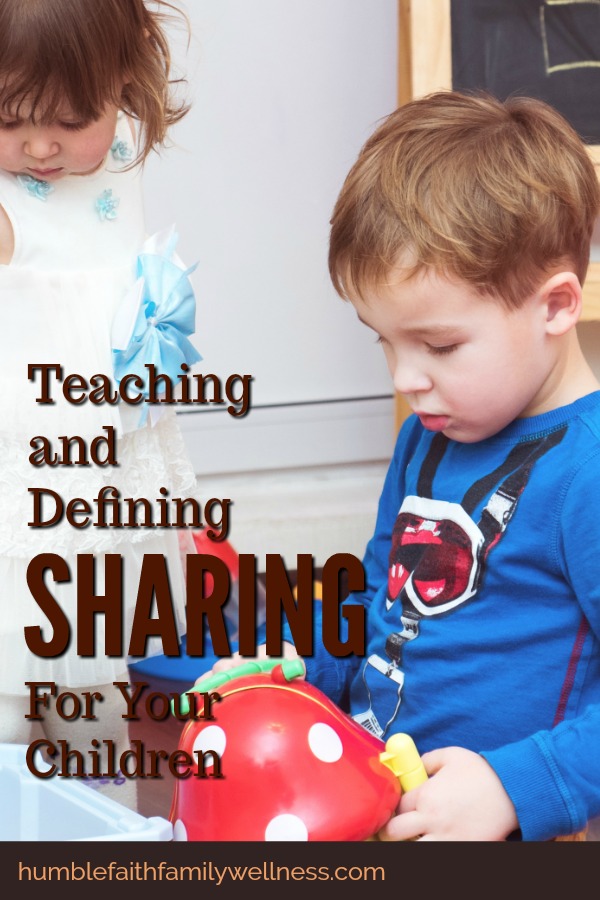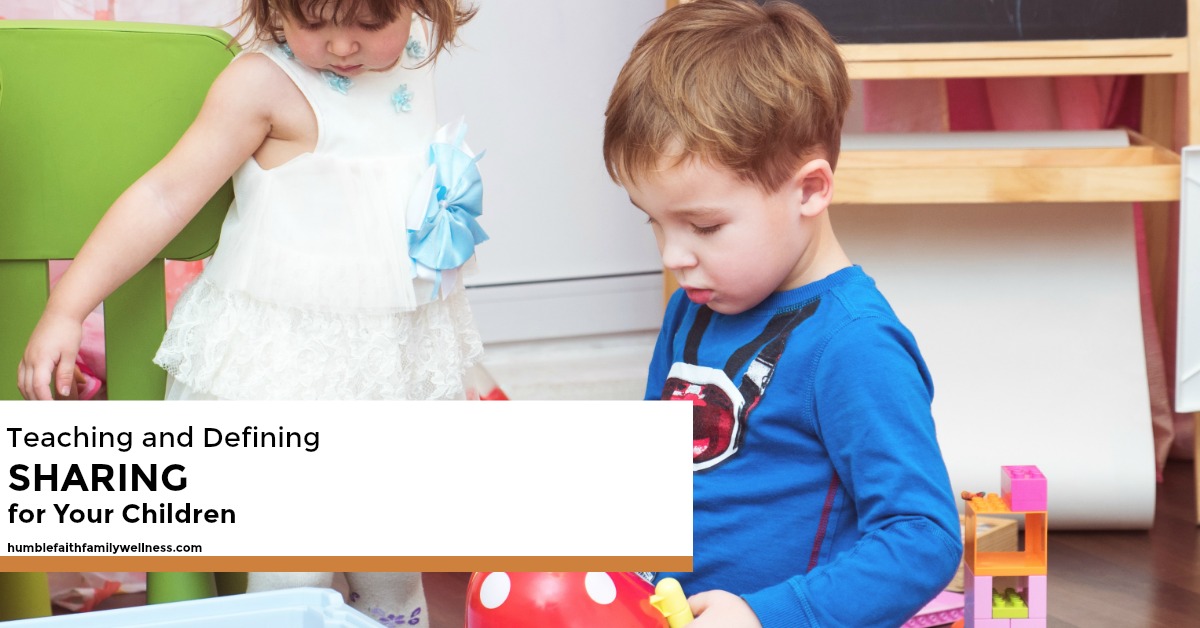
Teaching and Defining Sharing for Your Children
According to Merriam-Webster, the definition of sharing is to grant or give; to partake of, use, experience, occupy, or enjoy with others.
Are you wondering why I am giving the definition of sharing? It’s not a difficult concept, right?!
However, somewhere along the line, society has shifted the definition.
I’m seeing a change in how cartoons now are teaching sharing verses when I was a child. I’ve experienced the school’s policies on sharing. And as a therapist, I see a shift in how parents are teaching their children to share with each other in the home.
What is being taught now would be better described as ‘Forced Co-Ownership’. And it has unintended consequences.
[ctt template=”9″ link=”3IG5f” via=”no” ]Society has shifted the definition of sharing. It would be better described as forced co-ownership. And there are real unintended consequences for your children. Because it’s no longer a matter of the heart.[/ctt]
Forced Co-Ownership
What I am seeing now is that if you have something you must give it to someone else if they ask or want it. If you don’t, you are being described as mean and unwilling to share.
Yes, I know we want to teach our children to want to share. However, this model is taking the decision making and the control out of the hands of the person who owns the item. And putting it in the hands of the person who desires the item. That’s a big difference and alters the concept and heart of sharing.
Here’s an example. In the cartoon, My Big, Big Friend one of the character’s received his favorite dessert from his grandmother. He wanted to enjoy it outside. After he was outside, he saw his friends coming in his direction. He then hid under a bush so that they didn’t see his dessert and so he wouldn’t have to share. But the friends found him. They forced him to show what he had in his hands. Once they saw the dessert they all said they wanted a piece too. The entire rest of the episode was about the friends attempting to guilt him into sharing the dessert. And how because he wasn’t readily willing to, he was being mean. He eventually does and the episode ends happily with everyone eating his dessert.
But there’s a problem with this model.
Unintended Consequences for the Owner
No longer does the sharing come out of kindness but rather obligation. The decision is no longer theirs but forced. It takes the heart out of the equation.
Yes, we are supposed to give freely but giving and sharing is to be with a joyful heart. Not a sense of duty. When we teach our children that they have to share because someone else wants their items, or has less than them, we take away their control and choice.
We then have altered the “why” of sharing.
Unintended Consequences for the Receiver
I’ve come to see ‘forced co-ownership’ having the most negative unintended consequences for the receiver.
This model breeds greater entitlement. It reinforces for the receiver that if they ask, beg, whine, complain, and cause an overall ruckus they will get what they want.
I see this with siblings in families. One child, the owner of a toy is playing. The sibling wants to play, too. The owner doesn’t want the sibling to play. The sibling begins crying and complaining that the owner of the toy is being mean. The parents then steps in and tells the owner that he has to share and allows the sibling to have it for a designated period of time.
This scenario has not turned into forced co-ownership. The owner didn’t get to decide so it wasn’t a matter of the heart it became obligation.
But more importantly, the sibling then received the reinforcement that if he wants something, even if it’s not his, he has a right to have it, too.
True Sharing
So if we revisit the definition, sharing is granting or giving something to someone else. The definition shows the active choice of the owner to the receiver.
2 Corinthians 9:7 (NIV)
Each man should give what he has decided in his heart to give, not reluctantly or under compulsion, for God loves a cheerful giver.
Benefit for the Owner
When we teach our children to share based upon a loving heart and kindness we give them the decision.
This process means there may be times they choose not to share. While that can be a teaching moment, it still should be their decision.
We are called to teach to and guide their hearts. Not force. It is important that our children understand the real “why” of sharing.
Proverbs 11:24-25 (NIV)
One man gives freely, yet gains even more; another withholds unduly, but comes to poverty. A generous man will prosper; he who refreshes others will himself be refreshed.
Benefit for the Receiver
When a child does not get what they want, it is an opportunity for them to learn how to handle disappointment.
It is also a lesson in contentment. There are always going to be people who have more “stuff” than us. We are called to not envy or covet other people’s stuff. This life is not about acquiring stuff and life is not fair. This is a valuable lesson of the heart for the individual who does not receive what they desire.
Acts 20:35 (NIV)
In everything I did, I showed you that by this kind of hard work we must help the weak, remembering the words the Lord Jesus himself said; ‘It is more blessed to give than to receive.‘ (emphasis my own)
I pray that this post reminds you of the true meaning and purpose of sharing so that your children can understand the heart of the matter.
God bless!
Melissa

This was a very helpful post on teaching children why we share. I like that you talked about it being okay for them to decide not to share because even if we force them to share, it takes away the heart behind it.
Thank you Christina. Yes, allowing our kids to not share can be a hard thing as a parent. It can feel like we are reinforcing selfishness, however, God wants sharing and giving to be a matter of the heart. That takes time to develop. Thank you for reading and commenting! God bless!
You bring to light some very important thoughts on sharing, as well as mistakes that well meaning parents can make. I appreciate your quest to share your insights !!
Thank you Tammy! This can be an uncomfortable topic. We want peace in our home and our children to get along, but if we are forcing the topic without teaching the ‘why’ we are setting both children up for difficulties in the future. Thank you for stopping by and commenting. God bless!
I so wish I would have stumbled upon this post 10 years ago when I had newborn twins. Praying a mom of littles finds it in her time of need (or before it).
Thank you for such kind words Heather! That is my prayer as well. Thank you for stopping by and commenting. God bless!
Such a good post! You really made me think about sharing and how I model and/or teach sharing. It is a heart issue not an issue of force.
That is exactly it! Anytime we force something without the heart or providing the ‘why’ we fall into the trap of teaching a legalistic view of God. That takes away the relationship with Him. Thank you for stopping by and sharing your thoughts. God bless!
Wow, this is a great point! I’ve never thought of it this way, but the entitlement issue makes so much sense in light of this!
The new “sharing” really does lend itself to creating greater entitlement and struggles handling distress. Thank you for stopping by and sharing your thoughts. God bless!
Guilty here as the parent…of the 3-year-old who cries when siblings have something he wants. I have the older child give him the thing so he stops his crying.
Your post made me re-evaluate it for the future!
Thank you!
I appreciate your honesty Julie! We’ve all done it as parents to calm the situation. It’s easier. It’s much harder to sooth the crying child and teach to the heart of the older child. Thank you for sharing your experiences! God bless!
Ouch, this mommy is guilty of this😳. Love how God can point us to truth. Thankful for this lesson – sadly it is so true and at time even reinforced by other family members and friends upon my kids, so how do you deal with that?
There have been many times that I have parented over my parents regarding my children. I have stepped in while grandparents, aunts/uncles, etc. are trying to ‘force co-ownership’. I let them know I don’t agree with that understanding of sharing and then give them an adult scenario. “I really like your car…let me have it for a while.” That either raises a few eyebrows and gets a nod or ruffles a few feathers 🙂 Either way it opens the situation up for a greater conversation that can allow you to discuss the points from the post. Thank you for reading and sharing your thoughts and experiences. God bless!
This is so good! Entitlement is something we do not want to teach our children. We want them to share but most definitely do not want it to be forced. We’ve played with a few kids who do complain that one child isn’t sharing, but when I investigate it turns out the child who owns the Toy is playing with it and the other child wanted a turn but was not willing to wait patiently until the owner was finished playing. Could they play together? Yes. Is it ok for the first to finish playing and then let the other play? Yes. Is it ok for the owner to choose not to let the child play? Yes, especially if the child is too young or tends to damage others toys. In that case, I guide the owner to find something the other child can play with.
I agree that society’s forced sharing is not teaching sharing at all.
It can be so hard. Especially when we seem to live in a society that the squeaky wheel definitely gets the grease. And the result has gone so far as to change the entire concept of sharing. Thank you for sharing your thoughts and experiences. God bless!